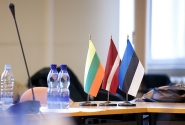
On Friday, 28 September, the Joint Judging Committee convened in the Saeima to evaluate nominees for the Baltic Assembly Prizes, and it unanimously decided to award this year’s Prize for Literature to Aivars Kļavis for his tetralogy On the Other Side of the Gate (Viņpus vārtiem).
“Aivars Kļavis’ tetralogy is remarkable for several reasons, not only because it was a huge work that took him more than ten years to write,” stressed Ieva Kolmane, a Latvian member of the Joint Judging Committee. “His works are a challenge to the historic novel as a genre, for they are based on an original perception of time as a nonlinear concept. All events in his works take place simultaneously, here and now, thus making us wonder whether our actions are the cause or the effect of an event; each person becomes a history maker,” said Kolmane. She also emphasised that this first international prize for the tetralogy On the Other Side of the Gate is a significant event for Latvian literature.
This year’s Prize for the Arts was awarded to the Estonian artist group Visible Solutions LLC for artistic achievements in integrating Estonian, Latvian and Lithuanian art scenes into one discussion arena.
The Prize for Science of this year will go to Prof. Dr. Habil. Algis Petras Piskarskas from Lithuania for his pioneering research in the field of laser physics and nonlinear optics, for development of innovative laser instruments and for fruitful international collaboration in Europe and worldwide.
It is planned to award the prizes during the annual session of the Baltic Assembly, which will take place on 9 November in Vilnius. Each prize is EUR 5,000.
The Joint Judging Committee consists of nine experts in literature, science and the arts from Estonia, Lithuania and Latvia.
The other nominees for Baltic Assembly Prize of this year were as follows:
in literature:
• Kajokas Donaldas (Lithuania), poet, essayist, prose writer; nominated for his poetry collection To the Deaf Little Donkey (Kurčiam asiliukui) (2011);
• Indrek Hargla (Estonia), prose writer; nominated for his series of novels Apothecary Melchior and the Mystery of St Olaf’s Church (Apteeker Melchior ja Oleviste mõistatus), Apothecary Melchior and the Ghost from Rataskaevu Street (Apteeker Melchior ja Rataskaevu viirastus), Apothecary Melchior and the Hangman’s Daughter (Apteeker Melchior ja timuka tütar);
in the arts:
• Audrius Ambrasas (Lithuania), architect; nominated for his highly praised public, administrative, commercial and residential buildings in Lithuania and abroad;
• Jānis Strupulis (Latvia), sculptor and medallic artist; nominated for his contribution to perpetuating the memory of great European, Latvian and world personalities of science and culture in medals and commemorative plaques;
in science:
• Prof. Aigi Rahi-Tamm (Estonia), history researcher; nominated for her research on Soviet repressive policies and deportations, thus contributing to the improvement of cooperation between Baltic historians and raising research into this topic to an international level;
• Dr. Art. Arnolds Laimonis Klotiņš and a group of authors: I. Grauzdiņa, L. Kārkliņš, D. Mazvērsīte, I. Šarkovska-Liepiņa (Latvia); nominated for the work Music under Occupation: Latvia’s Musical Life and Creativity. 1940-1945 (Mūzika okupācijā: Latvijas mūzikas dzīve un jaunrade 1940. 1945.) (2011).
The Baltic Assembly Prize was established in 1994, and it has been awarded to several well-known persons in the field of culture, science and the arts. In 2011, Arvydas Juozaitis, a philosopher from Lithuania, received the Prize for Literature for his book Riga – No One’s Civilization. Andris Nelsons, a conductor, was chosen for the Prize for the Arts for his outstanding achievements in promoting the performing arts and creating a positive image of Latvia in the world. Professor Andres Ilmar Kasekamp from Estonia was awarded the Prize for Science for his volume History of the Baltic States (2010).
The Baltic Assembly is an interparliamentary cooperation organisation of Latvia, Estonia and Lithuania, which was founded on 8 November 1991. The Baltic Assembly consists of 12 to 20 members from each country’s parliament. The Baltic Assembly is a coordinating and consultative organisation which has the right to express its opinion to national parliaments, governments and the Baltic Council of Ministers in the form of resolutions, decisions, declarations and recommendations; it can also request answers from these institutions on activities regarding cross-border issues that are on the agenda of the Baltic Assembly.
Saeima Press Service







